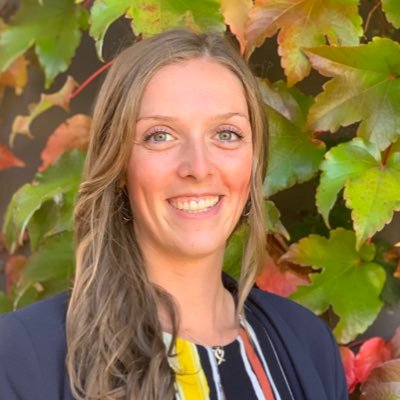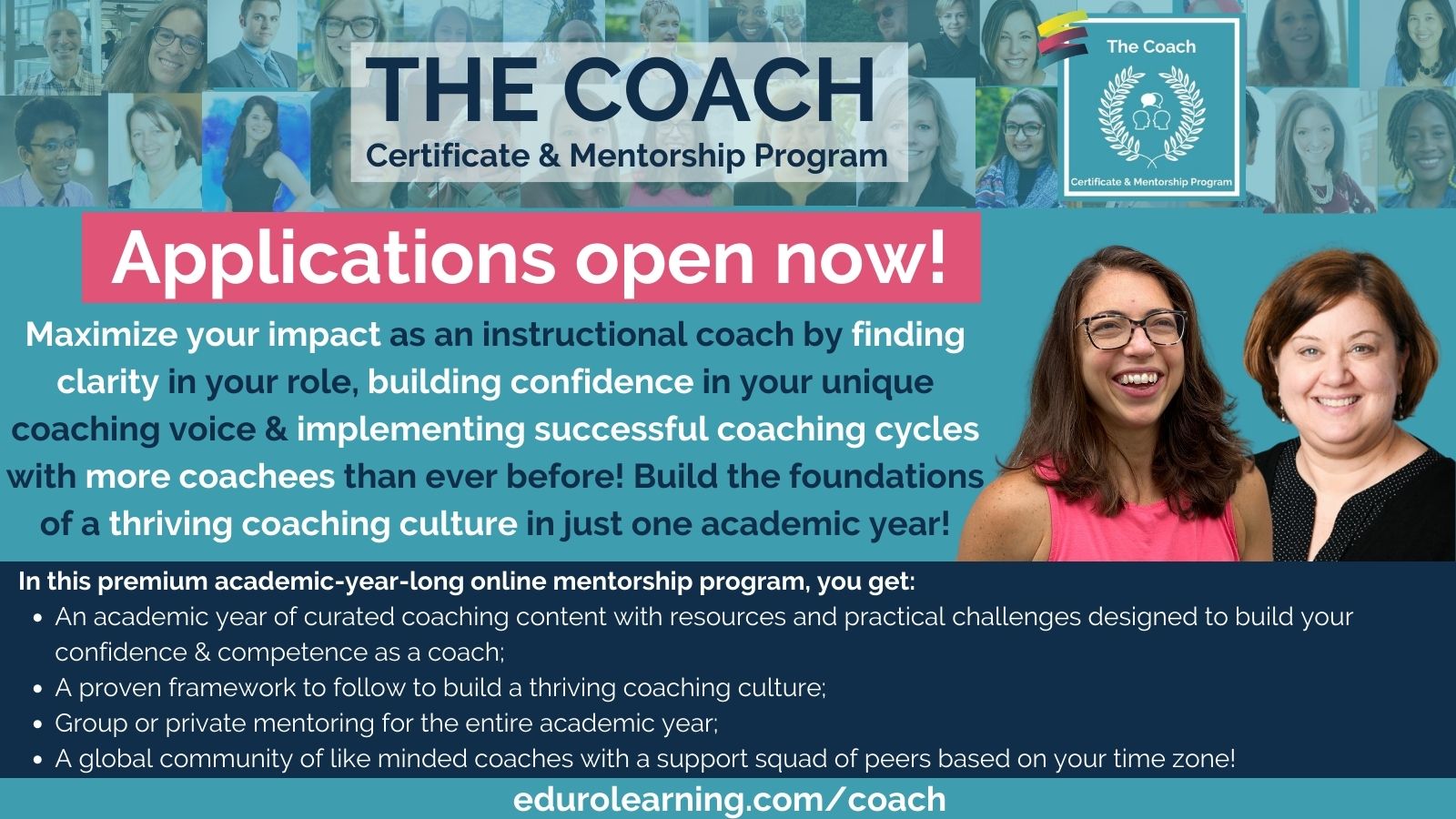In this #coachbetter episode, Kim discusses a taking coaching approach in leadership with Emily MacLean, Deputy Head of Junior School in Melbourne, Australia. This is a unique opportunity to hear from a school leader who is also actively coaching. In this conversation they discuss the importance of growth mindset, particularly within low staff turnover rates, the power of regular coaching conversations for professional growth, and where coaching fits in the process of teacher appraisal. This conversation is an in-depth look at how leaders can make coaching an integral part of their daily work – relevant for coaches and leaders alike!
Subscribe to #coachbetter via your favorite Podcast Player!
Featured Guest

Bonus! Watch the Spotlight Version on YouTube!
Show Notes
Deputy Head of Junior School, Melbourne, Australia
focused on innovative practice, coaching, edtech, women in leadership and making learning fun
Canadian, boarding school. China, Singapore where she became a Tech Coach. Currently in Australia. Dept Head of JS of a boys school, Title is Innovation and School Excellence.
Involves opportunities to innovate and collaborate among divisions. Lots of staff development. Looking at where holes are and filling those gaps. Collaborating with buddy girls’ school up the street.
2 big goals:
- As a PYP school, we’re working on taking teachers from where they’re at to where they want to be. Want our teachers to be inquirers. About the informal conversations at planning sessions. It’s about being a really good listener to what staff are saying and responding to that. Being a good listener and asking the right questions.
- Assessment. Better assessment for students, and online continual reporting. More ongoing feedback.
New role was created when Emily started. Has been molded into what she wants it to be. When she started, they didn’t have much tech in the younger years.
No formal coaches, but Emily takes a coaching approach. Focused on a Cognitive Coaching approach. Other Deputy is also coming from a coaching mindset. Appraisal is also leaning towards coaching. Thinking about having conversations at the beginning of the year, what support do you need, what are the small steps, and a final conversation at the end. Not so much about ticking a box, but more about taking the opportunities to move forward.
Focus is on thinking about PYP, and standards of practice. What’s next in our developmental practice. Staff meetings are mostly whole school. Some smaller groups on custom topics.
Coaching is non-evaluative, so how does coaching fit in with that in your context?
Formal appraisal structure was not really supporting teachers in their professional growth. Helping them see how it fits in with school goals. Once you have that conversation about their goals, it’s easier to have ongoing conversations, including informal conversations.
Staff members that have a growth mindset, it’s easy to support them. Those that are a bit more fixed in their thinking, it’s harder to pull them along. If people know you care, and you’re actually wanting to help them grow, they’ll stick with you.
Have you noticed any differences in how coaching is received from when you were a coach to now being in a formal leadership position? How do you wear those dual hats?
In all my current conversations, I don’t mark the teachers on the rubic, it’s more about them identify where they fit. Important to be part of the process from the beginning. It’s about being up front and honest. This is about you becoming a better professional. Having the conversation being about self-reflection is the key.
Having the same conversation with team leaders about goals.
What are the elements of growth mindset that are present in your school?
As a new PYP school, we know we’re beginners. When we don’t know something, we’re looking for support both internally and externally.
Junior School 420 students, 18 classes.
How does staff turnover impact culture?
Very low turnover of teachers each year. It’s a slow burn to get change going. Lots of little conversations and small pockets of change.
Good practice should be shared. At the beginning of each staff meeting “one good thing” is shared. When I see something that is really great, I ask teachers to share at the staff meeting. Could be as small as the way teachers ask questions in class.
When I send out agenda for staff meeting, also include a PL newsletter with examples of what teachers are doing in their classrooms, articles, other PL opportunities.
Work with a great team of curriculum coordinators. It’s not just me having these conversations.
Tell us a little more about your team and how they work together?
Management team
Curriculum team (Math, English, Arts, PSHE, Enhanced Learning & Specialist Coordinator, PYP, and other Dep Head). Every member of staff is required to be on one of those teams. One of our major goals is assessment. How do we better assess in that area?
What’s YOUR level of coaching mastery?
All coaches go through various stages of coaching mastery. Once you identify where you’re at, you can begin to build the skills needed to move to the next stage.
This quiz is based on real-life case studies compiled from years of working with coaches inside The Coach Certificate & Mentorship Program!
When you receive your results, you’ll also get your matching case study from the STRIVE Case Studies to see where you fit in the stages of coaching mastery.
Ready to tackle your challenges and move on to the next level in YOUR coaching practice?

The STRIVE Model of Coaching Mastery quiz will help you identify your level of coaching mastery by matching you with case studies compiled from years of working with coaches inside The Coach Certificate & Mentorship Program so you can easily see where you fit!
When you complete the quiz, you’ll get:
- Your matching case study,
- Specific strengths & challenges aligned to your result;
- Suggested next steps for each stage;
Plus the Case Study Document includes:
- Case studies leveled by coaching mastery;
- A framework to identify essential stages of professional growth & key areas to focus on in your professional learning;
- Alignment with the THRIVE Model for a Successful Coaching Culture;
- Space for you to reflect & prioritize so you can take action immediately!
You’ll go straight to the Quiz, and get the Case Study Document via email.
Show Notes continued…
What is / was the most innovative (or challenging) experience in your career had or is having an impact on your professional growth?
Year 5 classes in Singapore. Implementing student agency with a specific class, starting with their class website. At the end of the year, they created online courses for students by students, including all the tasks and assessments. We need to have student voice and agency in the classroom.
How are you empowering teachers to do this?
Starts with teacher agency. Encourage them to try things they wouldn’t normally try. Enhanced PYP is very student focused, student agency is at the core.
How can we bring a beginner’s mindset to a school community?
As a leader, it starts with me. I need to be vulnerable and say that I don’t have all the answers. Be transparent: this is the problem and we need a solution, we don’t know where that journey will take us, please join us.
Mistake: Not knowing how things have always been done. Learning is messy and we have to enjoy the mess along the way.
As you’re moving into a new school year, what’s something you’re excited about in the next academic year?
Head of JS says: “It takes three years to get to understand the job”. Knowing what I’m doing next year will be excited. Not just doing the basics, really able to stretch things and go further. Time to start building.
Advice to yourself: Ask as many questions as you can and take the time to listen. People will tell you what they want you to know. If you ask the questions to dig a little deeper to find out why they’re telling you that story is invaluable to understanding the history and culture
Please share a reading / resource you have explored recently that you think would be valuable to other teachers or coaches
Female leadership: LeadHerHigher: sharing out resources about female leadership.
@leadherhigher on social & FB group
Level Up Your Coaching with The Coach!
If you are ready to dive deep into your coaching practice, to help you #coachbetter and build a thriving coaching culture in your school, please join us for our next cohort of The Coach!
Wherever you are in building a coaching culture in your school, The Coach will give you the strategies, skills and tools you need to make coaching a success and will empower you to confidently apply instructional coaching strategies in any situation – from building a coaching program, to having coaching conversations, to being a leader in your school community. We facilitate only one cohort each academic year so we can offer individualized support for each participant.
Coaches of all levels are welcome: you’ll start the program with a self-assessment to determine exactly what the next steps are for you!






Recent Comments